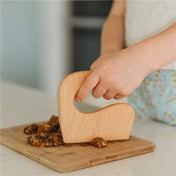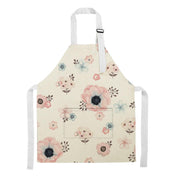8 undeniable benefits of puzzles for toddlers
Jigsaw puzzles are a must-have for every toddler… and they have been for a long time! The very first puzzle is said to have been made in the 1760s, meaning kids have been tackling puzzles for more than two centuries now!
There’s a good reason why puzzles have been a staple in every child’s toy box for so long — they’re fun, they’re challenging and each time a child finishes a puzzle, they walk away with more experience and more developed skills like concentration, problem-solving and patience.
Plus, they get a little confidence boost from finishing a challenging task all by themselves!
The benefits of jigsaw puzzles don’t end there — here, we share eight fantastic benefits of puzzles for toddlers like yours. Read on!
#1. Concentration & memory

Image: Solar System Puzzle
Completing a puzzle takes time — and that means you need to be able to concentrate on the task at hand as long as you can! According to child development experts, your little one can concentrate for about two to five minutes times their age. For example, a three year old might be able to concentrate on a task for six to 15 minutes.
Practicing concentration is one of the best benefits of puzzles for toddlers. A puzzle can give your child the opportunity to work on a single task for a long period of time uninterrupted. Just make sure to choose an age-appropriate puzzle for your child — if it’s too hard for them, they might get impatient and give up!
Puzzles can also help your child with their memory. For example, they might be holding a yellow puzzle piece that reminds them of a colour combination they’ve already seen in the puzzle. They can put two-and-two together and find the right spot to place the puzzle piece.
Alternatively, if they’ve already completed a puzzle and want to tackle it again, they might be able to finish the puzzle faster because they can remember the process from last time.
#2. Shape recognition

Image: Dinosaur Hatching Puzzle
At around three years old, most children are able to identify basic shapes like squares, circles and triangles (of course, development is fluid — your child might need a little extra time). Slowly but surely, your child will start to learn new shapes and identify properties that make certain shapes unique.
Puzzles can help children learn to recognise different shapes and where they fit in the puzzle. They can examine each puzzle piece and find the matching space in the puzzle. Plus, learning new shapes will help them later in life when they’re learning their ABCs and 123s — they should be able to recognise the shape of letters and numbers and attach meaning to them.
#3. Fine motor skills

Image: Toddler Knob Shape Puzzle
The muscles in your toddler's hands need a lot of practice to hold and move small objects — like puzzle pieces! Pegged puzzles are recommended to help build the fine motor skills that they’ll use later at school like holding a pencil or paintbrush. Your child will need to use a pincer grip to pick up the puzzle pieces and put them in the right spot.
#4. Hand-eye coordination

Image: Montessori Cylinder Post Box
Hand-eye coordination is a handy skill we all have at varying degrees of accuracy, so working on hand-eye coordination when your child is young is essential for their development!
Hand-eye coordination will help your child hold pencils at school, put food in their mouths and participate in ball games later in life.
Puzzles are great for building hand-eye coordination skills. To solve a puzzle, your child will need to pick up the puzzle pieces and place them in the right positions — be sure to let them practice this independently but give them helpful reminders and tips like “try wiggling it into place”.
#5. Problem-solving skills & logical thinking

Image: Creative Peg Puzzle
Puzzles are a basic problem — and a fun one, too! You need to use strategic thinking in order to solve a puzzle like grouping the puzzle pieces together by colour, grouping edged pieces together and building the outline of the puzzle first, and flipping all the pieces over to face upwards, making it easier to find the next piece of the puzzle.
In doing this, your child can learn to break down large tasks into smaller ones, making them easier to tackle. Soon, your little one will be able to apply this strategic, logical thinking to other aspects of their life… like finding a lost toy.
#6. Self-esteem

Image: Australia "Take Me With You" Puzzle
Solving a puzzle by yourself is extremely satisfying… all the pieces have come together to create a pretty picture, and all the messy puzzle pieces are gone! Like you, your child will get a major boost of confidence and self-esteem when they finally finish that challenging puzzle they’ve been working on.
Keep giving them praise and positive reinforcement until they reach their goal — then celebrate with them once they’ve finished!
#7. Patience

Image: 6 in 1 Mini Transportation Puzzle
Working on a puzzle takes a lot of patience… something a toddler doesn’t have a lot of! Children are often impulsive and when they want something, they want it now. A puzzle can teach your child to be patient — they’ll need to sit down and focus on putting the pieces together to gain that sense of accomplishment and see the finished product.
There’s no instant way to complete a puzzle, so this is a great way to exercise patience and concentration.
#8. Teamwork & social skills

Image: Pet Park Jigsaw Puzzle - 72pcs
Puzzles are perfect for teamwork! If your little one has siblings, cousins or friends from preschool, consider getting them together for a playdate and set the challenge of finishing a puzzle. Your child and their little friend can work on the puzzle together — they can talk their way through the challenge, give each other clues and compliments, and finish the puzzle faster.
This also gives your child the opportunity to work on their language and social skills!
Utilise the benefits of jigsaw puzzles to help your little one learn
We could go on about the benefits of puzzles for toddlers… there are just too many to count! But we hope you’ve learned a lot about puzzles here and can see the benefits for your toddler’s development.
Here at My Happy Helpers, we stock an incredible range of wooden puzzles for kids, from traditional puzzles to puzzles that your little one can stack high and balance the pieces. Browse through our collection online — we offer fast and affordable shipping throughout Australia as well as flexible payment options like Afterpay!




